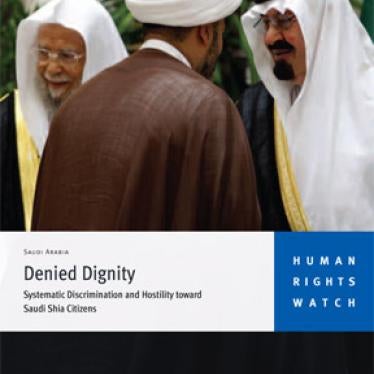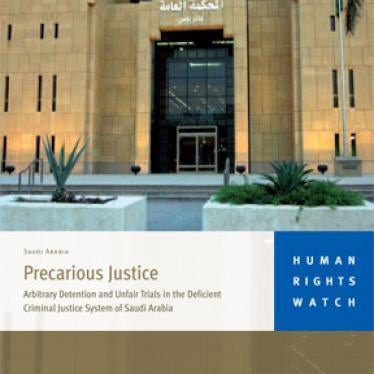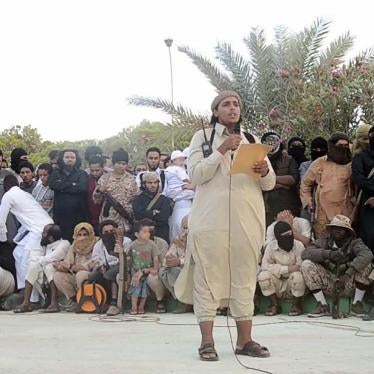(New York) - King Abdullah of Saudi Arabia should instruct officers of the Criminal Investigation Department in Khobar to immediately release a human rights activist who apparently was detained arbitrarily, Human Rights Watch said today. The charges against the activist, Shaikh Mikhlif bin Dahham al-Shammari, following his arrest on June 15, 2010, appear to violate his right to free expression, Human Rights Watch said.
Arresting officers told al-Shammari they were acting on the orders of Prince Muhammad bin Fahd bin Abd al-‘Aziz, the governor of the Eastern Province, in response to articles al-Shammari had written and published recently on several websites, blocked in Saudi Arabia, that criticized statements of clerics attacking Shia Muslims.
"Arresting Mikhlif al-Shammari's simply for opinions he expressed peacefully shows the limited reach of King Abdullah's commitment so far, five years into his reign, to protect human rights," said Sarah Leah Whitson, Middle East director at Human Rights Watch.
Earlier, on May 15, Khobar police arrested al-Shammari over the articles he had written criticizing anti-Shia religious views. Al-Shammari told Human Rights Watch at the time that he refused to answer questions put to him by the police since King Abdullah had ordered that cases regarding publications fall within the jurisdiction of the Ministry of Information and Culture, not the police and regular courts. The police released him after six hours based on a personal bail guarantee, but the police changed the description of his case from one concerning his articles to one of "creating public attention against corruption," al-Shammari told Human Rights Watch.
He was arrested again on the evening of June 15, while he was dining at the home of an acquaintance in Jubail, 80 kilometers north of his home in Khobar. Officers of the Criminal Investigation Department took him to the Khobar police station, where they placed him in a holding cell overnight with 10 other persons. Al-Shammari was able to communicate briefly with his family and Human Rights Watch. On June 16, he began a hunger strike to protest his arbitrary detention. His arrest was the result of the earlier investigation into his articles, al-Shammari told Human Rights Watch, but he has not been charged or brought before a prosecutor.
In one of the articles in question, al-Shammari responded to remarks of Muhammad al-‘Arifi, a controversial government-salaried imam of the Buradi mosque in Riyadh. During a sermon on January 1, al-‘Arifi had described Ayatollah Ali al-Sistani, whom many Saudi and other Shia Muslims consider their highest religious authority, as an "obscene, irreligious atheist." Al-Shammari asked how Sunnis would feel if a Shia had called al-‘Arifi an "obscene, irreligious, atheist Wahhabi in Najd." Al-Shammari added that he would not approve of such expression and would defend al-‘Arifi against such remarks.
Najd is a province in the heartland of Saudi Arabia and home to a significant number of members of Saudi Arabia's Sunni religious establishment. It was there that in 1744/1745 itinerant scholar Muhammad bin Abd al-Wahhab and the local ruler, Muhammad al-Sa'ud, forged a pact that would allow Abd al-Wahhab to spread his Islamic teachings while supporting the military conquests and rule of the Al Sa'ud. The pact between the ruling Sa'ud family and the religious establishment that follows "Wahhabi" interpretations of Islam endures to this day.
Al-Shammari is the representative for the Eastern Province of his al-Shammar tribe, who are Sunni Muslims from the area around Ha'il, in northwestern Saudi Arabia. He has gained prominence as a human rights activist in Saudi Arabia over the past several years. He has worked on improving relations between Sunnis and the local Shia population, including by writing articles against disparagement of Shias by Sunni extremists. However, Saudi authorities, who systematically discriminate against the Shia minority, have tried to undercut such efforts. After al-Shammari visited a prominent Saudi Shia cleric, Shaikh Hasan al-Saffar, Saudi secret police on February 4, 2007 arrested al-Shammari and detained him for three months without charge.
Since December 2009, al-Shammari has published 18 articles on public interest and human rights issues, including Sunni-Shia relations, on http://www.saudiyoon.com/, most of which also appear on http://www.rasid.com/.
Al-Shammari told Human Rights Watch that the officers who arrested him on the night of June 15 did not present an arrest warrant and that he was not officially charged. However, Khobar police officials told him that they were acting on orders of Prince Muhammad, the provincial governor.
Article 35 of Saudi Arabia's Law of Criminal Procedure of 2002 states that "no person shall be arrested or detained except on the basis of an order from the competent authority." Article 36 of the same law requires a written order specifying the reason for a person's detention or imprisonment and its length. In the chapter of the law relating to issuing arrest warrants, article 103 names the "investigator," who in Saudi Arabia is the prosecutor, as the authority to issue warrants. Article 104 further clarifies that an arrest warrant must include the suspect's name, nationality, occupation, place of residence, date, name and signature of the Investigator, and the official seal. Article 105 requires this warrant to be delivered to the suspect or one of his adult relatives residing with him.
In practice, however, few arrests follow the legal requirements. Instead, other Interior Ministry officials, including persons in the governor's office, order arrests and detentions. The Law of Criminal Procedure, article 9, includes "governors" in the list of law enforcement officers carrying out arrests, but the other articles indicate that only the prosecutors have the power to order arrests. An earlier, now abolished, law, the 1983 Regulation of the Sources of Detention and Temporary Confinement and Preventive Detention, authorized the Ministry of Interior officials to order and carry out arrests. Saudi Arabia did not create a prosecution service until 1989.
Article 14 of the Arab Charter on Human Rights, to which Saudi Arabia acceded in 2009, states that, "No one shall be subjected to arbitrary arrest, search or detention without a legal warrant" and, "No one shall be deprived of his liberty except on such grounds and in such circumstances as are determined by law and in accordance with such procedure as is established thereby."
Saudi Arabia has no penal code listing infractions and attendant sentences, leaving it entirely to the discretion of judges and, prior to any trial, law enforcement officials in the Interior Ministry, to determine what acts may have constituted a criminal offense. Such an arbitrary system of law is radically inconsistent with the protection of human rights, Human Rights Watch said, including, where the criminal law is used against speech, the right to freedom of peaceful expression.
Article 32 of the Arab Charter on Human Rights guarantees the right to freedom of opinion and expression, and to impart news to others by any means. The only restrictions allowed on the practice of this right are those imposed for "respect for the rights of others, their reputation, or the protection of national security, public order, public health, or public morals."








